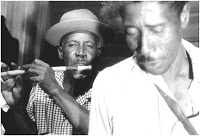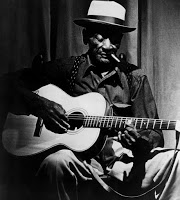Travel with ethnomusicologist and filmmaker Bess Lomax-Hawes as she reveals the profound regional spirituals of the Georgia Sea Island Singers (1964). Brilliant documentarian Les Blank's A Well Spent Life (1971) taps into the rich history of 75 year-old blues guitarist Mance Lipscomb.
A beautiful portrait of Texas share-cropper turned blues great, Mance Lipscomb by legendary documentarian Les Blank. Lipscomb is considered one of the greatest guitarists of all time, but did not record until the 1960s.
"For almost 20 years, Les Blank has scoured modern America for the remnants of a simpler, happier, richer life. A life that usually centers around such indigenous music as blues, zydeco and norteño. His lyric documentaries honor the origins and settings that beget such music in what has evolved into a personal visual language: skies and rivers and roads and fields and pastures; tools and wildflowers; well-worked hands and well-earned faces; and, above all, food–the festive, greasy, smoking, aromatic indelicacies of America’s regional cuisines. His work is a national treasure and is worth a look almost without exception.
In 'A Well Spent Life' all of Blank’s visual and philosophical trademarks combine with a protagonist who can make a case for them: then 75-year-old Mance Lipscomb, lifelong husband and farmer and recently rediscovered singer and guitarist. Two odd tales of marriage, one involving 50 years of separate dinners and another a lost leg–add a twist to Lipscomb’s praise of domestic tranquility without making it seem false, and his seamed face adds its own ripple to the placid pastoral surface. We’re glimpsing the inside of a man, not the outside of a symbol." -Robert Christgau and Carola Dibbell

Georgia Sea Island Singers (B+W, 1964)
Pure spirituals are sung as they were 100 years ago on St. Simon's, an isolated island off the Georgia coast. A stunning and chilling piece of ethnographic musicology from Bess Lomax-Hawes, and her brother, legendary ethnomusicologist Alan Lomax. This simple and mesmerizing short documents the regional and personal gospel stylings of the Georgia Sea Island Singers from the isolated community of the Sea Islands off the Georgia coast. The singers stand in front of a black background and sing a capella with brief voice overs and titles discussing the history of the community and the significance of the music. The isolated sea islands have kept musical traditions alive from the time of slavery. Each song is introduced by explanatory titles and is first sung unaccompanied by two men and three women, later with a tambourine, a broom handle on a board, and dancing.





